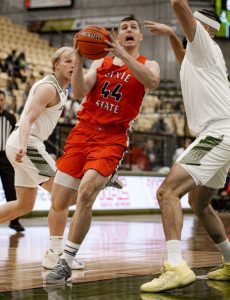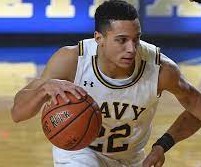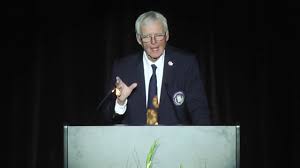UTSA has only made 4 NCAA tourney appearances in program history…and Tim Carter was the coach for 2 of them. The all-time winningest coach in school history, he won a pair of conference tourney titles in 1999/2004 and was named conference COY in 1999. HoopsHD’s Jon Teitel got to chat with Tim about making the NCAA tourney and working for Leonard Hamilton. Today is Coach Carter’s 65th birthday so let us be the 1st to wish him a happy 1!
You went to college at Kansas: what is your favorite memory of those late-1970s Jayhawk teams? When I transferred from Hutchinson CC I was asked by assistant coach Duncan Reid to walk onto the team after he saw me play in a fraternity basketball tourney, but I said no because I wanted to graduate on time. Professionally it might have been the worst mistake I ever made because it is important to know people on the inside. I remember sitting up in the stands thinking of the day when I would be down on the sideline because I knew that I wanted to be a coach. I enjoyed watching the games, especially my senior year when we had Darnell Valentine.
In the 1987 NCAA tourney as an assistant at Houston, Danny Manning had 12 PTS in a win by Kansas: how did it feel to face your alma mater, and could you tell at the time that Manning was going to become a star? My 1st NCAA tourney experience was in 1983 as a graduate assistant to Billy Tubbs at Oklahoma when Wayman Tisdale was an All-American as a freshman. It was a very tough time for me because I had lost my mom unexpectedly only 2 weeks earlier so I was in a fog. I knew that Manning would end up as a great player: as the saying goes, “A dog will bite you even as a puppy”.
In the 1990 NIT as an assistant at Oklahoma State, Luc Longley got an offensive rebound/put-back with 2 seconds left in a 2-PT win by New Mexico: where does that rank among the most devastating losses of your career? That would probably be far down the list: I had a few that were more devastating as a head coach (last-second losses, half-court shots, etc.) that just put you on your knees. As an assistant at Florida State we got beat at home by BC: the head of officiating got on a plane to come apologize to us in person because it ruined our chances of making the NCAA tourney.
In the 1994 NIT as an assistant at Northwestern you had a 1-PT win over DePaul: how were you able to overcome a 12-PT halftime deficit? We had a good team: I came in 3 years earlier with those seniors and we had 3 rough years before that. We were 13-14 and needed to beat Michigan’s Fab 5 at home just to qualify for the NIT…and we did it. The NIT wanted us to match up against a local team in DePaul so it was a great end to the careers of those seniors and was very satisfying. I still have a ball signed by everyone on that 1994 team. To beat another Chicago team was huge: the place was jam-packed and had a great atmosphere.
In 1999 you were named Southland Conference COY at Texas-San Antonio: what did it mean to you to receive such an outstanding honor? Any time your peers vote you Anything of the Year it is great. We should have won the conference championship but lost to Southwest Texas State. We had Devin Brown, who later won an NBA title with the Spurs. We had built the program the right way and had a really good team. It is always huge to make the NCAA tourney for the 1st time as a head coach.
In the 1999 NCAA tourney Richard Hamilton scored 28 PTS in a win by eventual champion UConn: where does that Huskies team rank among the best you have ever seen? I have been in a lot of great conferences and seen a lot of great teams, but they have to be in the top-5 of anyone that I coached against. We kept it close for a while and then they went on a huge run. Coach Jim Calhoun actually missed that game due to illness so the Huskies were led by Dave Leitao. I always hated to take my team to games at high altitude like that 1 in Denver: 1 of my players subbed out of the game and it looked like his lips were blue!
In the 2004 NCAA tourney Josh Childress scored 26 PTS in a win by #1-seed Stanford: how did you prepare a #16 seed knowing that a #1 seed had never lost its 1st opening game? You do not make any changes: we just tried to go do what we did to get there. You know the opponent is bigger/stronger so you just hope/pray that you are hot that night, and if you are really hot then you will have a chance to win. If you do anything different then you might really screw your guys up: it is awfully tough.
You remain the all-time winningest coach in school history: what made you such a great coach, and do you think that anyone will ever break your record? We did a really good job of recruiting and I tried to never over-coach them. My high school coach put us in a system that allowed us to play hard so I tried to do that. The key is to get good players: you cannot win the Kentucky Derby with a donkey!
In 2006 you became an assistant coach to Leonard Hamilton at Florida State: why did you take the job, and what was the most important thing that you ever learned from him? I took the job because I wanted to stay in the business after the AD at UTSA decided to go in a different direction. I had worked for Coach Hamilton at Oklahoma State and he called me up 1 day and asked me to work for him. I could not have asked for a better friend to reel me back in. The 1 thing I learned from him is to be singularly focused: he has an unbelievable focus and really cares for his players. He always told me that I should never turn recruiting over to my assistant coaches because I was so good at it.
You later coach junior high school basketball in San Antonio: how did you like the job, and what do you hope to do in the future? I love being back in San Antonio and teaching middle school. I had no intention of coaching but they asked me to do it and I thoroughly enjoyed it. I enjoy speaking to students about making wise decisions when choosing a college. I had a chance to get back into college coaching but I came here and really enjoyed it.








